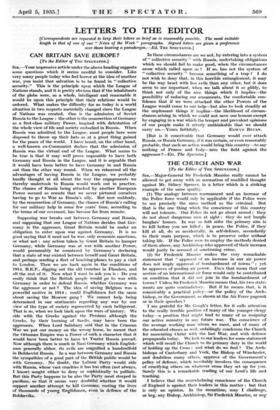LETTERS TO THE EDITOR
[Correspondents are requested to keep their letters as brief as is reasonably possible. The most suitable length is that of one of our "News of the Week" paragraphs. Signed letters are given a preference over those bearing a pseudonym.—Ed. THE SPECTATOR.]
CAN BRITAIN SAVE EUROPE?
[To the Editor of THE SPECTATOR.]
Sia,—Your impressive article under the above heading suggests some questions which it seems needful to consider. Like very many people today who feel horror at the idea of another war, you insist that salvation is to be found in "collective security." This is the principle upon which the League of Nations stands, and it is pretty obvious that if the inhabitants of the globe were, as a whole, intelligent and reasonable it would be upon this principle that their relations would be ordered. What makes the difficulty for us today is a world situation in two respects materially changed since the League of Nations was created. One is the admission of Soviet Russia to the League : the other is the resurrection of Germany as a first-class military Power, inspired with detestation of the whole view of life and society embodied in Russia. When Russia was admitted to the League, most people here were disposed to throw up their hats as at a great thing gained for the peace of the world. I have heard, on the other hand, a well-known ex-Communist declare that the admission of Russia was the virtual end of the League. What seems to be true is that it may well prove impossible to have both Germany and Russia in the League, and it is arguable that it would have been better to have Germany in and Russia out than the other way round. When we rehearsed all the advantages of having Russia in the League, we probably hardly thought at all about the way the engagements we thereby undertook to Russia would work out in practice. The chance of Russia being attacked by another European Power seemed so remote that we never pictured ourselves having to go to War as Russia's ally. But now suddenly, by the resurrection of Germany, the chance of Russia's calling for our military help in some few years' time, according to the terms of our covenant, has become far from remote.
Supposing war breaks out between Germany and Russia, and supposing that our League of Nations decides that Ger- many is the aggressor, Great Britain would be under an obligation to enter upon war against Germany. It is no good saying that it need not be war, only economic sanctions, or what not : any action taken by Great Britain to hamper Germany, while Germany was at war with another Power, would presumably be countered by Germany's declaring that a state of war existed between herself and Great Britain, and perhaps sending a fleet of bombing-planes to pay a visit to London. Then we are back again in the conditions of 1914, B.E.F., digging out the old trenches in Flanders, and all the rest of it. Now what I want to ask you is : Do you really think that the British people would .go to war with Germany in order to defend Russia, whether Germany was the aggressor or not ? The idea of saving Belgium was a powerful motive in 1914; could Englishmen feel the same about saving the Moscow gang ? We cannot help being determined in our sentiments regarding any war by our view of the type of society represented by each belligerent. That is so, when we look back upon the wars of history. We side with the Greeks against the Persians although the Greeks, by their burning of Sardis, may have been the aggressors. When Lord Salisbury said that in the Crimean War we put our money on the wrong horse, he meant that the Ottoman Empire was a Power of such a character that it would have been better to have let Tsarist Russia prevail. Now although there is much in Nazi Germany which English- men generally abhor, its evils are magnified a hundredfold in Bolshevist Russia. In a war between Germany and Russia the sympathies of a good part of the British public would be with Germany. No doubt, the Labour Party would side with Russia, whose vast cruelties it has too often (not always, I know) sought either to deny or sophistically to palliate. But this Party happens to be also the Party most steeped in pacifism, so that it seems very doubtful whether it would support another attempt to kill Germans, costing the lives of thousands of young Englishmen, even in defence of the Bolsheviks. In these circumstances are we not, by entering into a system of " collective security" with Russia, undertaking obligations which we should fail to make good, when the circumstances arose which called upon us ? If so, has not the system of "collective security" become something of a trap ? I do not wish to deny that, in this horrible entanglement, it may be the way beset with less evils than any other, but it does seem to me important, when we talk about it so glibly, to think not only of the nice things which it implies—the possibility of reducing our armaments, the comfortable con- fidence that if we were attacked the other Powers of the League would come to our help—but also to look steadily at the unpleasant things it implies—the likelihood of circum- stances arising in which we could not save our honour except by engaging in a war which the temper and prevalent opinions of our people make it utterly unthinkable that we should [But is it conceivable that Germany would ever attack Russia, or Russia Germany, if it was certain, or even reasonably probable, that such an action would bring this country—to say nothing of France and Italy—into the field against the aggressor ?—En. The Spectator.]










































 Previous page
Previous page